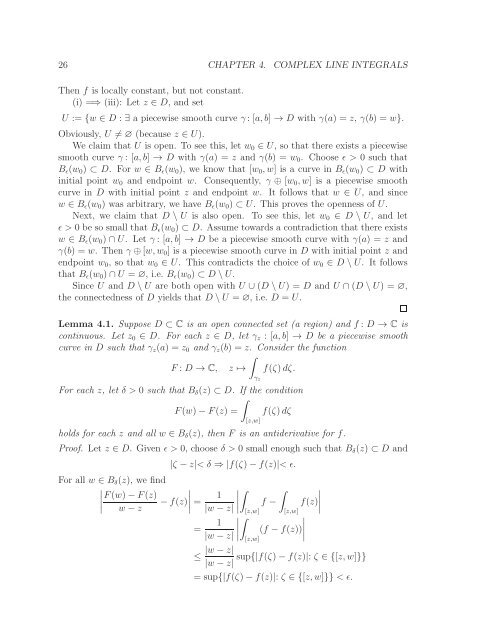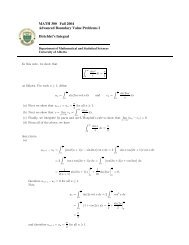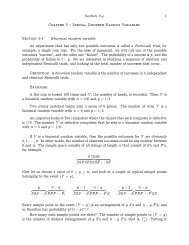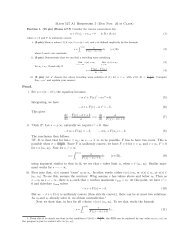Math 411: Honours Complex Variables - University of Alberta
Math 411: Honours Complex Variables - University of Alberta
Math 411: Honours Complex Variables - University of Alberta
You also want an ePaper? Increase the reach of your titles
YUMPU automatically turns print PDFs into web optimized ePapers that Google loves.
26 CHAPTER 4. COMPLEX LINE INTEGRALS<br />
Then f is locally constant, but not constant.<br />
(i) =⇒ (iii): Let z ∈ D, and set<br />
U := {w ∈ D : ∃ a piecewise smooth curve γ: [a,b] → D with γ(a) = z, γ(b) = w}.<br />
Obviously, U �= ∅ (because z ∈ U).<br />
We claim that U is open. To see this, let w0 ∈ U, so that there exists a piecewise<br />
smooth curve γ: [a,b] → D with γ(a) = z and γ(b) = w0. Choose ǫ > 0 such that<br />
Bǫ(w0) ⊂ D. For w ∈ Bǫ(w0), we know that [w0,w] is a curve in Bǫ(w0) ⊂ D with<br />
initial point w0 and endpoint w. Consequently, γ ⊕ [w0,w] is a piecewise smooth<br />
curve in D with initial point z and endpoint w. It follows that w ∈ U, and since<br />
w ∈ Bǫ(w0) was arbitrary, we have Bǫ(w0) ⊂ U. This proves the openness <strong>of</strong> U.<br />
Next, we claim that D \ U is also open. To see this, let w0 ∈ D \ U, and let<br />
ǫ > 0 be so small that Bǫ(w0) ⊂ D. Assume towards a contradiction that there exists<br />
w ∈ Bǫ(w0)∩U. Let γ: [a,b] → D be a piecewise smooth curve with γ(a) = z and<br />
γ(b) = w. Then γ⊕[w,w0] is a piecewise smooth curve in D with initial point z and<br />
endpoint w0, so that w0 ∈ U. This contradicts the choice <strong>of</strong> w0 ∈ D \U. It follows<br />
that Bǫ(w0)∩U = ∅, i.e. Bǫ(w0) ⊂ D \U.<br />
Since U and D \U are both open with U ∪(D \U) = D and U ∩(D \U) = ∅,<br />
the connectedness <strong>of</strong> D yields that D\U = ∅, i.e. D = U.<br />
Lemma 4.1. Suppose D ⊂ C is an open connected set (a region) and f : D → C is<br />
continuous. Let z0 ∈ D. For each z ∈ D, let γz : [a,b] → D be a piecewise smooth<br />
curve in D such that γz(a) = z0 and γz(b) = z. Consider the function<br />
�<br />
F: D → C, z ↦→ f(ζ)dζ.<br />
For each z, let δ > 0 such that Bδ(z) ⊂ D. If the condition<br />
�<br />
F(w)−F(z) = f(ζ)dζ<br />
γz<br />
[z,w]<br />
holds for each z and all w ∈ Bδ(z), then F is an antiderivative for f.<br />
Pro<strong>of</strong>. Let z ∈ D. Given ǫ > 0, choose δ > 0 small enough such that Bδ(z) ⊂ D and<br />
For all w ∈ Bδ(z), we find<br />
� �<br />
�<br />
�<br />
F(w)−F(z) �<br />
� −f(z) �<br />
w −z � =<br />
|ζ −z|< δ ⇒ |f(ζ)−f(z)|< ǫ.<br />
=<br />
��<br />
1 �<br />
�<br />
|w−z| �<br />
��<br />
1 �<br />
�<br />
|w−z| �<br />
[z,w]<br />
[z,w]<br />
� �<br />
�<br />
f − f(z) �<br />
�<br />
[z,w]<br />
�<br />
�<br />
(f −f(z)) �<br />
�<br />
≤ |w−z|<br />
|w−z| sup{|f(ζ)−f(z)|: ζ ∈ {[z,w]}}<br />
= sup{|f(ζ)−f(z)|: ζ ∈ {[z,w]}} < ǫ.







